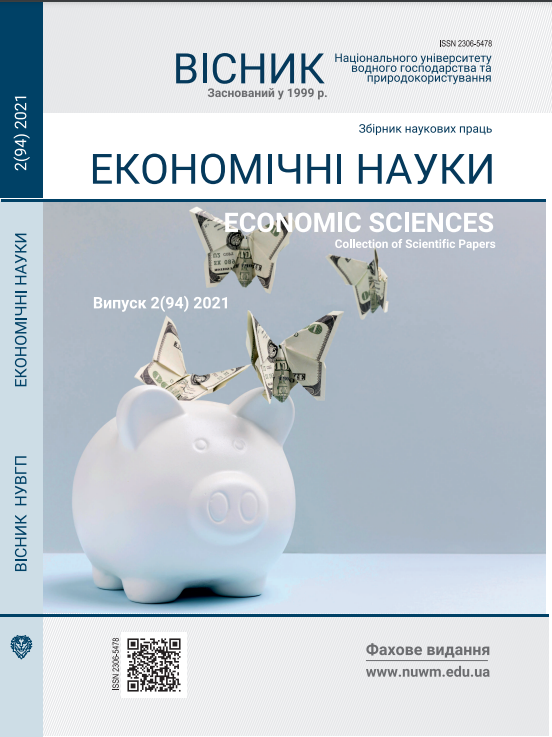DEVELOPMENT OF THE ACCOUNTING AND ANALYTICAL SYSTEM IN THE CONDITIONS OF DIGITALIZATION OF THE ECONOMY OF UKRAINE
DOI:
https://doi.org/10.31713/ve2202115Keywords:
accounting and analytical system, digitization, blockchain, cloud technologies, accounting information systems.Abstract
The article examines the impact of digitalization of the economy on the development of accounting and analytical system of the enterprise. It is established that in the context of digitalization of the national economy, information becomes the main source of competitiveness of the business entity. The usage of large data sets and the functioning of the accounting and analytical system are closely interrelated as their role is to ensure effective management decisions. Data collection, generalization and processing allow obtaining valuable information for economic processes. However, digital thinking is not focused exclusively on new technologies, as the ability of a specialist to evaluate, analyze the conclusions obtained using specialized computer programs, and generate effective strategic decisions based on them is becoming increasingly valuable. Main digital technologies that are available in accounting in modern economic and technological development were characterized: accounting information systems, advanced language of financial, management, tax reporting of various business areas (XBRL), «cloud technology» computing, blockchain, electronic data exchange, social networks.The interpretation of the concept of «digital modernization of accounting and analytical system» is presented as a set of interrelated measures, coordinated in time, which involves the use of logistical, informational, human, financial and other resources to create information systems, informatization and digitization of information resources, which meet certain technical conditions and quality indicators. It is determined that the transformation of the accounting andanalytical system of the enterprise in accordance with the requirements ofthe information economy should consist of software, information, organizational and methodological components. These components become the main components of the accounting information system, which is integrated into the web-system of the entity. The relevance of the use of IT innovations in accounting processes is substantiated. The using of IT innovations allows to solve new problems, modernize the concepts of information processing and transmission, contributes to the efficiency of accounting processes.References
Li Ying, Dai Jing, Cui Li. The impact of digital technologies on economic and environmental performance in the context of industry 4.0: A moderated mediation model. International Journal of Production Economics. 2020. № 229. DOI:10.1016/j.ijpe.2020.107777 (дата звернення: 22.05.2021).
Булыга Р. П. Аудит бизнеса: стратегическое направление реформирования аудита в XXI веке и ветвь научных исследований Финансового университета. Аудиторские ведомости. 2017. № 9. С. 5–11.
Osadcha O., Liashenko O., Pavelko O., Markov R., Yurkiv N. Methodology of financial and economic analysis of innovative activities of enterprises in the conditions of the digital economy. Фінансово-кредитна діяльність: проблеми теорії та практики. 2020. 4 (35). С. 202–211. URL: https://doi.org/10.18371/fcaptp.v4i35.222027 (дата звернення: 22.05.2021).
Akimova L. M., Levytska S. O., Pavlov K. V., Kupchak V. R., Karpa M. I. The role of accounting in providing sustainable development and national safety of Ukraine. Financial and Credit Activity: Problems of Theory and Practice. 2019. 3(30). Рр. 54–61. URL: https://doi.org/10.18371/fcaptp.v3i30.179501 (дата звернення: 22.05.2021).
Спільник І., Палюх М. Бухгалтерський облік в умовах цифрової економіки. Інститут бухгалтерського обліку, контроль та аналіз в умовах глобалізації. 2019. Вип. 1–2. С. 83–96.
Облік і контроль в управлінні економічною стійкістю підприємств в умовах глобалізації : монографія / В. Ф. Максімова, Н. О. Лоханова, О. В. Артюх та ін. ; за ред. В. Ф. Максімової. Одеса : ОНЕУ, 2014. 397 с.
CarlssonWall M., Kraus K. Opening the black box of the role of accounting practices in the fuzzy front-end of product innovation. Industrial Marketing Management. 2015. Vol. 45. Pp.184–194. DOI:10.1016/j.indmarman.2015.01.007 (дата звернення: 22.05.2021).
Dainienė R., Dagilienė L. Accounting-based Valuation of Innovation: Challenges and Perspectives. Procedia – Social and Behavioral Sciences, 2014. Vol. 156. Pp. 589–593. DOI:10.1016/j.sbspro.2014.11.246 (дата звернення: 22.05.2021).
Майер Шенбергер В. Большие данные. Революция, которая изменит то, как мы живем, работаем и мыслим. М. : Манн, Иванов, Фербер, 2014. 132 с.
Ben Youssef A., Boubaker S., Dedaj B., Carabregu-Vokshi M. Digitalization of the economy and entrepreneurship intention. Technological Forecasting and Social Change. 2020. DOI:10.1016/j.techfore.2020.120043 (дата звернення: 22.05.2021).
Richardson L. Digital and Platform Economies. International Encyclopedia of Human Geography. 2020. Pp. 317–321. DOI:10.1016/b978-0-08-102295-5.10533-5 (дата звернення: 22.05.2021).
Лень В. Обліково-аналітична система підприємства: обґрунтування визначення, модель. Проблеми і перспективи економіки та управління. 2016. № 1. С. 281–290.
Пикалов П. А. Цифровая экономика в бухгалтерском учете. Актуальные вопросы современной экономики. 2020. № 4. URL: https://readera.org/cifrovaja-jekonomika-v-buhgalterskom-uchete-143171461 (дата звернення: 22.05.2021).

